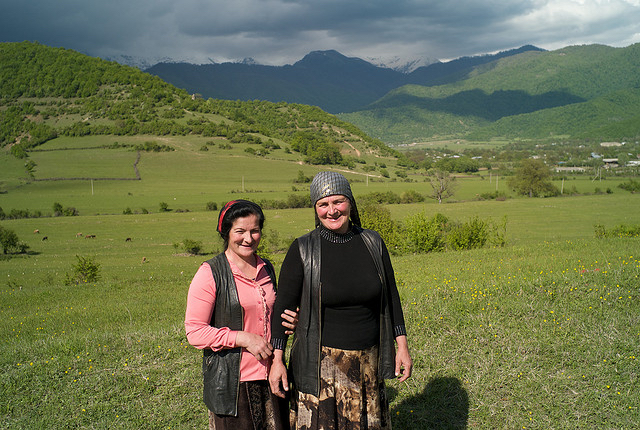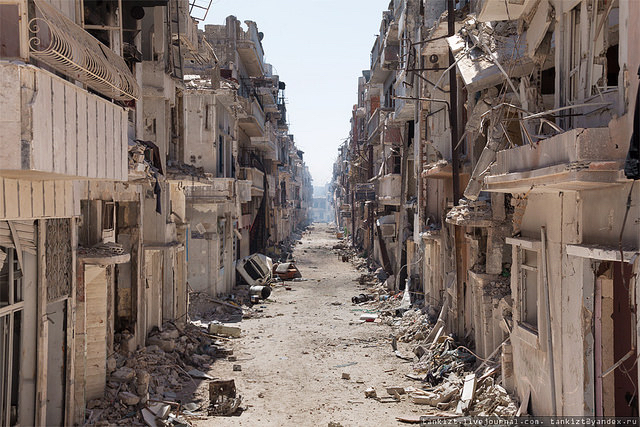When I called a father-in-law of one of the women who purportedly left Georgia to join fighters in Syria (along with a relative), he shouted angrily, saying that the “girls are simply” in Turkey, and that the gossip must stop.
“Don’t call here again, they are working there, hanging up now,” Merab said. I didn’t buy it. There was something distinctly unconvincing about his reply.
Historically a tolerant country, Georgia is slowly embarking on the path of ISIS. Muslims consist of at least 10% percent of the former Soviet state’s population, and have lived peacefully in the primarily Orthodox country for generations.
But, as more than a hundred young Georgian men are said to be fighting in Syria, women, and young girls appear to be following suit.
The Georgian ISIS idol is a ginger-bearded general, a local from this region named Tarkhan Batirashvili’who renamed himself ‘Omar al-Shishani’. One of the most feared jihadists in the Middle East, Al-Shishani is reported to have recently been killed in Iraq, although his home village residents deny the claim.
A recent story, involving the aformentioned father-in-law, which received attention from Georgian media, is that of Elmira Suleymanova and Diana Gharibova, two women in their late twenties, who were confirmed to have crossed the border into Turkey.
What was noteworthy about their departure from their homes, in Kharajala, in eastern Georgia, was that they left their children behind, along with notes for their families to look after them.
Neither of them were in difficult personal or financial situations. But they both suddenly became devout followers of Islam. It is unknown whether they managed to reach their destination.
“It’s a catastrophe what is going on today,” Imran Ayvazov, of the Caucasus Muslim Rights Union said in an interview on Rustavi 2 this month.
“We must find those who influence women with children and young women to commit such acts. Who is zombying them? Those websites must be banned!”
In a similar situation, the news about 17 year-old Rumisa spread quickly around Georgia, following reports that the young girl had missed school, and had followed her husband to Syria. He had already been fighting there for a year.
Rumisa’s trip may be legal, as she had permission from both parents to leave the country, an official from the Interior Ministry commented. But it was hard not to see her as yet another ISIS bride, albeit one from Georgia.

Why Georgia? One expert in North Caucasus issues, who refused to be named, told me that the heavily Chechen Pankisi Gorge area is popular for Muslim bride dealing. “She was married off to a fighter of course, arranged by the parents,” he said.
Since the first Chechen war in the mid-1990s, the Pankisi area has been full of Chechen radicals, seeking refuge from Russian forces. Some figures estimate Chechens to make up over 70% of the population.
A local Imam, explained that local women, especially young ones, are not treated badly by the community, and that no one is forcing them to go off and marry fighters. He said that he would not comment on the participation of the local youngsters in the atrocities in Syria.
I challenged a local youngster to tell me more about Rumisa’s departure. He responded by defending it as an act of tradition, as a marriage very common in the region. Unsurprisingly, a recently published report states that a significant number of young Muslim girls in the region marry at a very early age, irrespective of where they live, in the city or rural areas, and their class status. Age fifteen is quite common.
This fits the demographic of the young Georgian jihadists, headed off to fight in Syria. Recently, for example, two local schoolboys, aged 16 and 18, disappeared, only to email their whereabouts to their parents, finally, that they had reached Syria.
During a recent visit to Georgia, US Lieutenant- General Ben Hodges said that when it comes to the challenges like ISIS, we need diplomatic pressure, economic pressure, that Georgia has to compete in the information space and have strong military. This may be true, but clearly there are other factors at play, which neither the people I spoke to, nor studies of the Georgian Muslim community like the one I looked at, seem to convey.
The government has done little to stem the tide. It also tends to ignore the frequent violation of human rights which taken place in the country, when it comes to tolerating early marriages for young girls, especially amongst ethnic minorities. A high number of reports have been filed in Georgia, indicating that thousands of girls aged 13 to 15 stop attending school, in order to be married. Though illegal, there is very little the government can do to stop it.
It’s not unreasonable to imagine what community these young girls come from, and what might happen to them. That much is clear. The question is what kinds of conditions are compelling their families to sell them off, and whether this is a consequence of discrimination, or economic circumstances, taken advantage of by Islamic conservatives, from abroad.
The following note was passed on to me, written by a student from Pankisi for a local news blog, which relies on stories written by kids in the area, about their community, and friends. For obvious reasons, the moderator found it inappropriate to publish.
“The religion of Pankisi is Islam. Muslims go to do Jihad. Nowadays, Jihad is in Syria. Teenagers from Pankisi go to Syria to do Jihad. They think that it is the right way. A lot of teenagers died in Syria for Allah. They think that when they die in Jihad they will go to heaven. They fight against Assad soldiers. The mojahids are from all over the world, including from Pankisi.”
Photographs courtesy of Scott McDonough. Published under a Creative Commons license.





